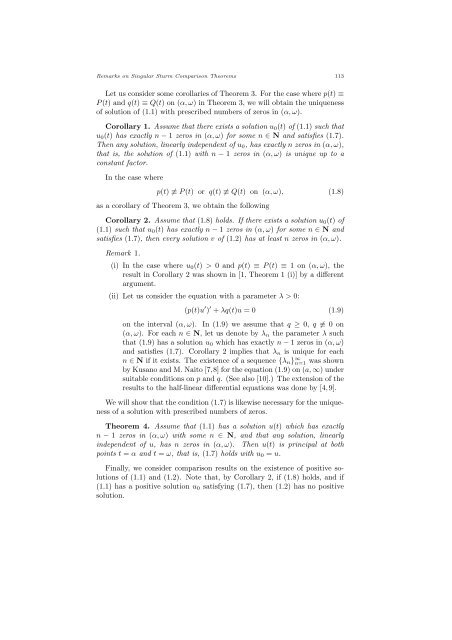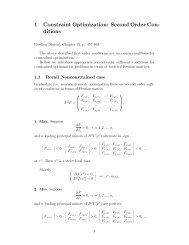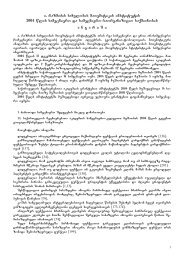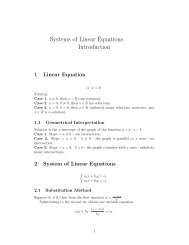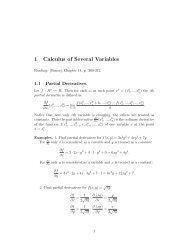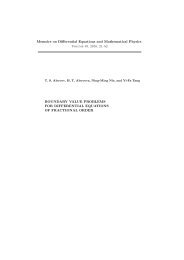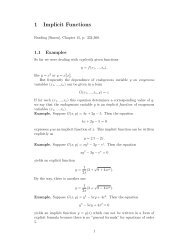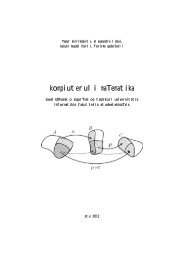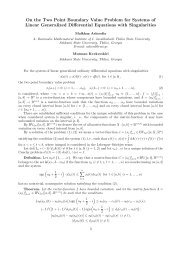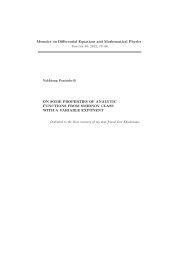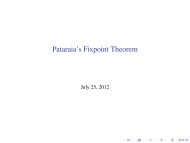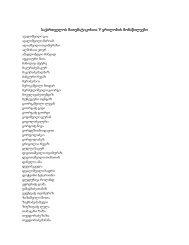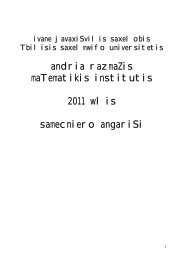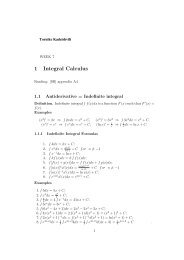REMARKS ON SINGULAR STURM COMPARISON THEOREMS
REMARKS ON SINGULAR STURM COMPARISON THEOREMS
REMARKS ON SINGULAR STURM COMPARISON THEOREMS
Create successful ePaper yourself
Turn your PDF publications into a flip-book with our unique Google optimized e-Paper software.
Remarks on Singular Sturm Comparison Theorems 113<br />
Let us consider some corollaries of Theorem 3. For the case where p(t) ≡<br />
P (t) and q(t) ≡ Q(t) on (α, ω) in Theorem 3, we will obtain the uniqueness<br />
of solution of (1.1) with prescribed numbers of zeros in (α, ω).<br />
Corollary 1. Assume that there exists a solution u 0 (t) of (1.1) such that<br />
u 0 (t) has exactly n − 1 zeros in (α, ω) for some n ∈ N and satisfies (1.7).<br />
Then any solution, linearly independent of u 0 , has exactly n zeros in (α, ω),<br />
that is, the solution of (1.1) with n − 1 zeros in (α, ω) is unique up to a<br />
constant factor.<br />
In the case where<br />
p(t) ≢ P (t) or q(t) ≢ Q(t) on (α, ω), (1.8)<br />
as a corollary of Theorem 3, we obtain the following<br />
Corollary 2. Assume that (1.8) holds. If there exists a solution u 0 (t) of<br />
(1.1) such that u 0 (t) has exactly n − 1 zeros in (α, ω) for some n ∈ N and<br />
satisfies (1.7), then every solution v of (1.2) has at least n zeros in (α, ω).<br />
Remark 1.<br />
(i) In the case where u 0 (t) > 0 and p(t) ≡ P (t) ≡ 1 on (α, ω), the<br />
result in Corollary 2 was shown in [1, Theorem 1 (i)] by a different<br />
argument.<br />
(ii) Let us consider the equation with a parameter λ > 0:<br />
(p(t)u ′ ) ′ + λq(t)u = 0 (1.9)<br />
on the interval (α, ω). In (1.9) we assume that q ≥ 0, q ≢ 0 on<br />
(α, ω). For each n ∈ N, let us denote by λ n the parameter λ such<br />
that (1.9) has a solution u 0 which has exactly n − 1 zeros in (α, ω)<br />
and satisfies (1.7). Corollary 2 implies that λ n is unique for each<br />
n ∈ N if it exists. The existence of a sequence {λ n } ∞ n=1 was shown<br />
by Kusano and M. Naito [7,8] for the equation (1.9) on (a, ∞) under<br />
suitable conditions on p and q. (See also [10].) The extension of the<br />
results to the half-linear differential equations was done by [4, 9].<br />
We will show that the condition (1.7) is likewise necessary for the uniqueness<br />
of a solution with prescribed numbers of zeros.<br />
Theorem 4. Assume that (1.1) has a solution u(t) which has exactly<br />
n − 1 zeros in (α, ω) with some n ∈ N, and that any solution, linearly<br />
independent of u, has n zeros in (α, ω). Then u(t) is principal at both<br />
points t = α and t = ω, that is, (1.7) holds with u 0 = u.<br />
Finally, we consider comparison results on the existence of positive solutions<br />
of (1.1) and (1.2). Note that, by Corollary 2, if (1.8) holds, and if<br />
(1.1) has a positive solution u 0 satisfying (1.7), then (1.2) has no positive<br />
solution.


